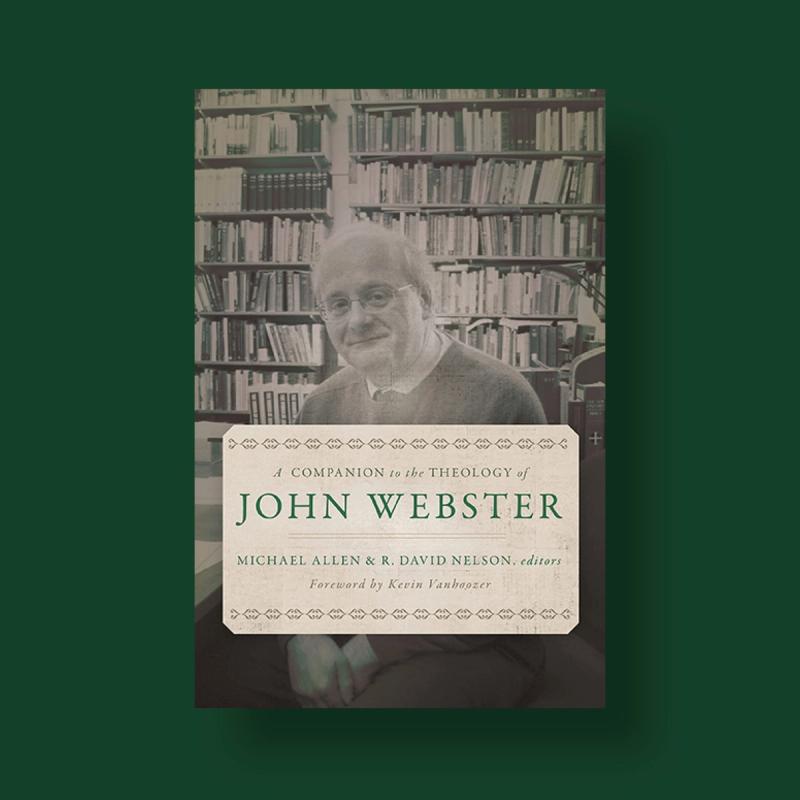***
Eerdmans | 2021 | 366 pages (hardcover) | $50.00
John Webster has been called “the theologian’s theologian” for his incisive style and project of “theological theology,” which responds to the revelation of the Triune God in faithful speech and action. Theology in the hands of Webster is always a vital act, coram Deo, marked by astonishment and joy paired with intellectual precision. As Kevin Vanhoozer notes in the foreword, “When [theologians] are together en famille, they read Webster” (xiii). While Vanhoozer is knowingly exaggerating here, there is something to this statement. Over the past twenty years, there has been a growing sense in the Anglophone theological world that John Webster was not only doing some of the most interesting work, but that his path of theological theology seemed to be the way forward. Many eagerly awaited his projected five-volume systematic theology, which felt assured to be a monumental publication in dogmatics. His untimely passing in 2016 was mourned throughout the theological world, even by those who knew him only through his writings.
It is a rare event and high honor for any theologian to be deemed significant enough to have a companion reader that lays out their career and scholarly contributions, even more so immediately after their death. This work, edited by Michael Allen and R. David Nelson, is not only in honor of Webster, but it is also the first sustained scholarly engagement with his work. A companion to Webster is particularly useful, given the form of his theological contributions. While Webster wrote several books (especially Holiness and Holy Scripture), his preferred genre was the theological essay. The contributors have successfully assembled the various threads from Webster’s corpus to weave a more complete tapestry of his theological project.
This volume, which offers seventeen chapters with a foreword and epilogue, presents its readers with a thoroughgoing introduction to Webster’s life and thought. After opening with a brief academic biography, it is divided into two parts. The first discusses Webster’s theological development across his academic career, and the second expounds his understanding of and contribution to significant theological loci. The work also presents the most comprehensive and up-to-date bibliography of Webster’s corpus. The contributions come from some of the leading theologians who are attempting a revival of dogmatics for the twenty-first century. These include Michael Allen, Matthew Levering, Fred Sanders, Katherine Sonderegger, and many others. David Nelson’s epilogue is of particular interest. By looking at Webster’s original project proposal and indications in his later work, Nelson offers insights into the systematic theology that might have been had Webster lived.
The project of theological theology is the unifying feature across these essays, as it was in Webster’s own thought over the past twenty years. Webster’s main thought was to center the doctrine of the Triune God as the ground for all knowledge of God himself, his acts, and his will. As Fred Sanders in his essay on Webster’s Trinitarianism writes, “All other doctrines orbit this doctrine, and it orbits none” (155). The various essays of this volume bring this theme out with reference to different theological loci. For instance, the doctrine of Scripture must be grounded in the Triune God’s perfections and presence with his people (ch. 7). The doctrine of salvation can only be seen clearly when grounded in the Triune life as the font of grace, which experiences no lack in itself or need of the creature but loves in freedom. As Ivor Davidson notes, for Webster, “the whole economy flows in free mercy from the nature of the triune God himself” (231).
The contributors spin out these ideas essay after essay, demonstrating the verve of Webster’s work to ground all theology in God as the source, object, and ultimate end of the intellectual and spiritual task of theology. As quoted repeatedly throughout this companion, Webster envisioned theology as all-inclusive and focused. In “What Makes Theology Theological?” in God without Measure: Working Papers in Christian Theology, vol. 1 (London: T&T Clark, 2018), Webster writes:
Theology is a comprehensive science, a science of everything. But it is not a science of everything about everything, but rather a science of God and all other things under the aspect of createdness. (214–15)
In a companion of this type, variability in the quality of entries is to be expected. But considered overall, this companion amply succeeds in laying out a treatment of the theology of Webster that will both inform those unfamiliar with him and aid in the scholarly approach to his theology. Part I on Webster’s theological development will likely be of main interest to the latter group, but this section offers the most comprehensive account of Webster’s academic trajectory available. The chapters treating Webster’s contribution on specific doctrines are well executed, if sometimes hindered by Webster’s paucity of specific interactions on a given topic. The chapter on salvation, for instance, does not discuss the nature of sin or the atonement, since Webster did not offer sustained treatments of either.
The companion has two stand-out essays. The first by Fred Sanders on Webster’s view of the Trinity is indispensable in understanding the heart of his theology. Sanders’s expertise in Trinitarian theology and clarity of writing facilitates an effective bringing together of Webster’s abundant commentary on the Trinity that is diffuse throughout his works. Katherine Sonderegger’s entry on Jesus Christ, however, shines above the rest, owing to the magisterial nature of the subject and the ambition of treatment. She not only gives an expert exposition of Webster’s Christology in Trinitarian perspective, but she also situates him in relation to modern theological trends. The essay argues for the power and freshness of Webster’s approach and suggests paths for future development. Also, her almost lyrical theological style functions well to bring out Webster’s ideas. As she summarizes, “Jesus Christ is the radiant self-communication of God” (219). John Webster’s theology was a gift to the church in his unpretentiousness and incisiveness to invoke a desire to know the Triune God and all things in relation to the Triune God. For those looking for an introduction to Webster’s theology and contribution, this companion is a sure and steady guide. As I am sure every contributor would say, however, don’t read this instead of Webster—read it only to read him better. There are certain figures whose full message and subtlety can be appreciated only through reading and rereading. Begin with Webster’s Holiness and Holy Scripture, and then let this companion guide you deeper into his work. In many ways, this volume is an encouragement to the reader not only to pick up Webster but to pick up where he left off—to develop a proper theological theology where he was prevented by mortality, and to popularize his insights for the sake of the church and to the glory of the God he served.
K. J. Drake (PhD, Saint Louis University) is Sessional Assistant Professor of History at Redeemer University in Ancaster, Ontario. He is the author of The Flesh of the Word: The extra Calvinisticum from Zwingli to Early Orthodoxy (Oxford University Press, 2021).








